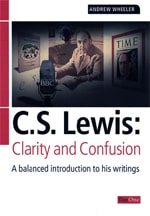
Paperback, 144pp. Published by Day One Publishing, Ryelands Road, Leominster, HR6 8NZ, UK Price £6, ISBN 1-84625-046-0
So, how far should we go in our admiration of C. S. Lewis? Andrew Wheeler has set out to write a balanced introduction to Lewis’ Christian beliefs. On the cover, Dr. Hadden Wilson neatly summarizes the book by saying, ‘Andrew Wheeler commends and endorses Lewis where his writings conform to orthodox evangelical theology, and takes issue with him when they do not’.
The book is in three parts, with three appendices: the first part gives us a brief sketch of Lewis’ life; in the second we learn of Lewis’ conversion. His keen awareness of the sinfulness of sin, his faith in Christ, his knowledge of God in Christ, and his views of the Christian’s future are all touched on. Much of this section receives Wheeler’s approval, and on the way he helpfully highlights several important truths. In the third section, the author takes issue with Lewis over ‘some areas of concern’. He identifies Lewis’ flawed view of scripture, of creation, his belief that followers of other religions can be saved. Finally, he addresses Lewis’ attitude to Christendom, in particular, Roman Catholic teaching.
Much of what Wheeler says will be acceptable to readers of this magazine. However, this book should not be read uncritically. For example, the section on paganism would have benefited from being set firmly in the context of Paul’s thesis in Romans 1, where he describes the way in which man has rejected the knowledge of God. Paganism is the direct result of such rejection. Equally, with regard to Roman Catholic teaching on purgatory (which Wheeler rightly condemns), it would have been helpful if the author’s comments had been located in a context which unambiguously acknowledged the Rapture and the Judgement Seat of Christ. The statement ‘that we are made completely holy the moment we die’ requires fuller treatment if confusion over the distinction between the believer’s standing and his state is to be avoided.
C. S. Lewis was no theologian, nor did he claim to be one. His value as a Christian apologist lies elsewhere. Perhaps the greatest value of this stimulating book is that it brings with it a salutary reminder that, in the things of God, even the keenest intellect will fall short if it does not submit itself to the absolute authority of the word of God written. In the words of F. F. Bruce’s paraphrase of 1 Corinthians chapter 4 verse 6, ‘Keep to the book’!
[Our thanks to Ed Hotchin, Hucknall, Nottingham, UK, for this review]
| Cookie | Duration | Description |
|---|---|---|
| cookielawinfo-checkbox-advertisement | 1 year | Set by the GDPR Cookie Consent plugin, this cookie is used to record the user consent for the cookies in the "Advertisement" category . |
| cookielawinfo-checkbox-analytics | 11 months | This cookie is set by GDPR Cookie Consent plugin. The cookie is used to store the user consent for the cookies in the category "Analytics". |
| cookielawinfo-checkbox-functional | 11 months | The cookie is set by GDPR cookie consent to record the user consent for the cookies in the category "Functional". |
| cookielawinfo-checkbox-necessary | 11 months | This cookie is set by GDPR Cookie Consent plugin. The cookies is used to store the user consent for the cookies in the category "Necessary". |
| cookielawinfo-checkbox-others | 11 months | This cookie is set by GDPR Cookie Consent plugin. The cookie is used to store the user consent for the cookies in the category "Other. |
| cookielawinfo-checkbox-performance | 11 months | This cookie is set by GDPR Cookie Consent plugin. The cookie is used to store the user consent for the cookies in the category "Performance". |
| elementor | never | This cookie is used by the website's WordPress theme. It allows the website owner to implement or change the website's content in real-time. |
| viewed_cookie_policy | 11 months | The cookie is set by the GDPR Cookie Consent plugin and is used to store whether or not user has consented to the use of cookies. It does not store any personal data. |